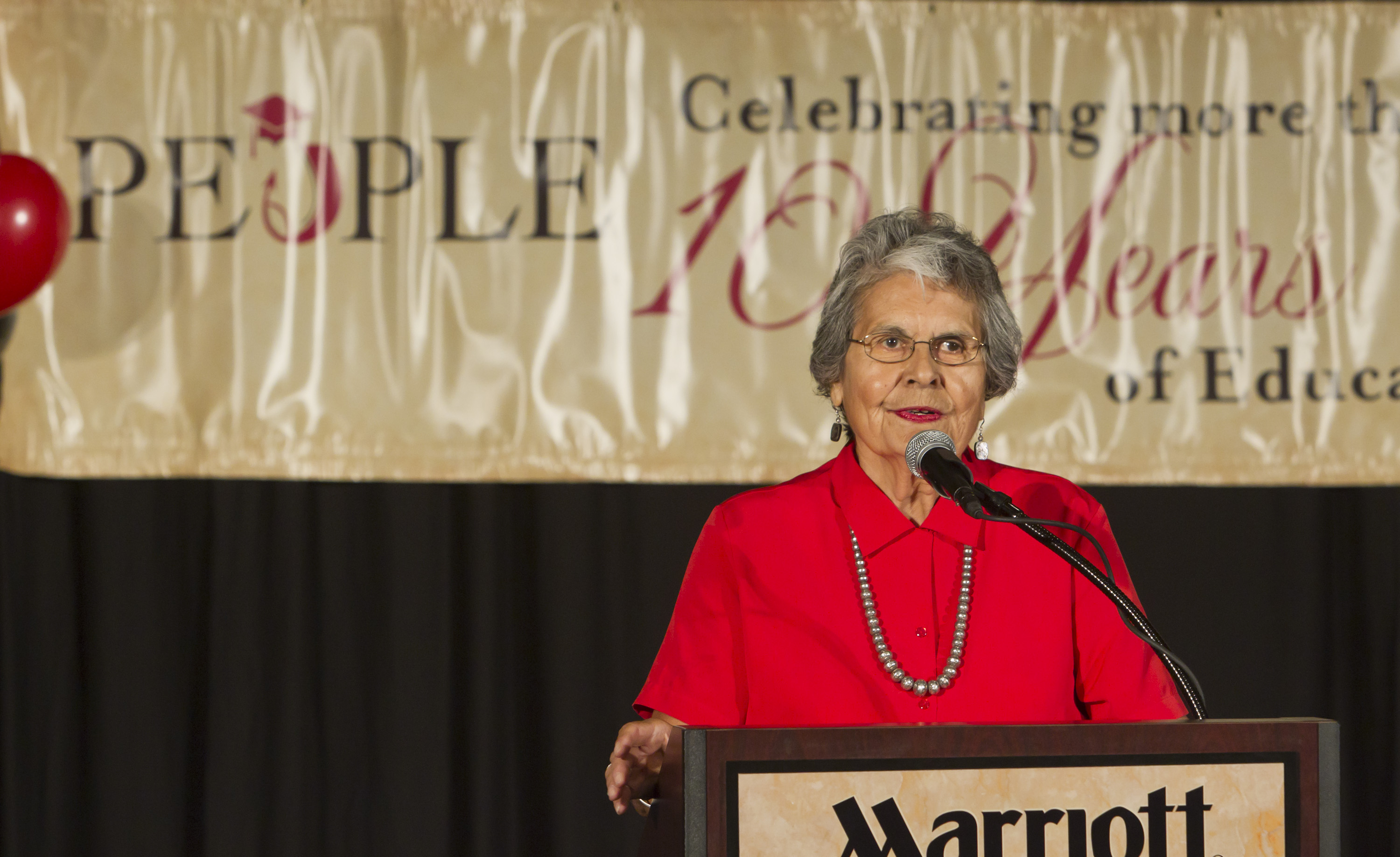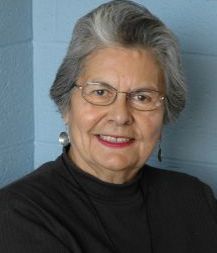Elders-in-Residence Program will bring Native community leaders to campus for mentoring, support

Ada Deer speaks at the annual PEOPLE program banquet in 2011. Andy Manis
A new initiative at the University of Wisconsin–Madison will seek to improve the experience of American Indian and Alaskan Native students by hosting Native elders on campus for extended visits and educational exchanges.
The inaugural participant will be Ada Deer, a nationally recognized social worker, community organizer, political leader and champion of Indian rights. Deer was the first woman to be appointed assistant secretary of Indian affairs in the U.S. Department of the Interior and the first Native American woman to head the Bureau of Indian Affairs. She will spend the week of Nov. 12-16 on campus.
The initiative is called the Culture Keepers/Elders-in-Residence Program. Its goals include: strengthening partnerships between tribal nations and the university; providing all students with access to crucial cultural resources; and improving retention and recruitment rates for Native students.
“Ada is the perfect community leader to launch this program,” says Larry Nesper, a professor of anthropology and American Indian studies and director of the American Indian Studies Program. “She has broken down so many barriers and achieved so many ‘firsts.’ She’s an amazing role model.”
Deer, who resides in the Madison area, led the successful campaign to restore federal recognition of the Menominee Tribe. She was the first member of the Menominee to earn an undergraduate degree from UW–Madison — in 1957 — and the first chairwoman of her tribe. She was the first Native American woman to run for Congress in Wisconsin, winning the Democratic primary in her district.
Deer taught for many years in the UW–Madison School of Social Work and directed the American Indian Studies Program from 2000 to 2007. She is a distinguished lecturer emerita.
“I’ve been thoroughly impacted by UW–Madison at every level, so I am an eternal fan of the university and do whatever I can to help,” Deer says. “This opportunity is especially close to my heart. I hope my presence and my experiences can serve to inspire and motivate our Native students as well as other students.”
Senior Kelsey Lutgen says Deer will be an incredible resource to students. Lutgen, a political science major and the Native American campus organizer at the Multicultural Student Center, is helping to coordinate a gathering with Deer and Native student organizations.
“Wisconsin has so many tribal nations, yet Madison is geographically disconnected from many of them,” says Lutgen, who grew up in Minneapolis and is a member of the Oglala Sioux Tribe. “To be able to talk and interact with a tribal leader will be such an asset, especially for students who really struggle with not having their own tribal community represented on campus.”
The Culture Keepers/Elders-in-Residence Program is a project of the Native Nations_UW Working Group, which formed in 2016 and includes representatives from UW–Madison (including UW–Extension) and UW Colleges. (The underscore in the title reflects the connection between the entities, with Native Nations in the lead position as a show of respect.)
The lead partners for the Elders-in-Residence Program at UW–Madison are the American Indian Studies Program, University Housing and the Nelson Institute for Environmental Studies. Additional partners include the Division of Student Life, the Multicultural Student Center and the School of Human Ecology.
The working group is co-chaired by Jessie Conaway, a faculty associate for Native Nations Partnerships at the Nelson Institute, and Professor Annie Jones, an organization development specialist and Tribal Nations liaison at UW–Extension.
The program is in its pilot phase, with at least one additional elder-in-residence anticipated during the spring semester, Conaway says.
“We view all the projects we’re working on, including this one, as respectful and reciprocal partnerships with Native Nations and communities in Wisconsin,” she says. “All 12 Wisconsin tribes have been invited to work with us on inviting cultural leaders and elders to campus.”
The residency lengths will vary, and the activities during the visits will be based on individual agreements with each elder, Conaway says. Examples of possible activities include: supporting cultural events; holding office hours for student mentoring; supporting faculty members in their teaching and research; and joining bi-weekly faculty and student lunches at the American Indian Student & Cultural Center.
Upon its formation in 2016, the working group pledged to work with Native Nations to create broad educational networks, respectful research relationships, and culturally competent engagement programs. Members held eight listening sessions across the state to gather feedback and ideas from Native Nations. An additional session with Native American students was held on the UW–Madison campus.
“We asked people, ‘What are your priorities and needs, and what things can we do better to be a resource to Native Nations?’” says Paul Robbins, director of the Nelson Institute. “An elders-in-residence program was mentioned by participants in many of the meetings, including by students. So while it’s just one part of a larger, concerted effort to establish educational partnerships with Tribes, it’s been at the top of our wish list.”
To assist with the program, UW–Madison will provide a dedicated campus apartment for an elder and a companion during each residency. Future goals for the program include curriculum development that features Native perspectives, cross-cultural teaching experiences, and possibly hosting a residential learning community, Robbins says.
“We really want to cement these efforts as part of campus culture,” he says.
During the week of Nov. 12-16, Deer will hold drop-in student office hours at 318 Ingraham Hall from 10-11 a.m. Monday-Wednesday and 2-4 p.m. Tuesday, Thursday and Friday. Others interested in meeting with Deer are asked to call 608-263-5501 to discuss availability.





